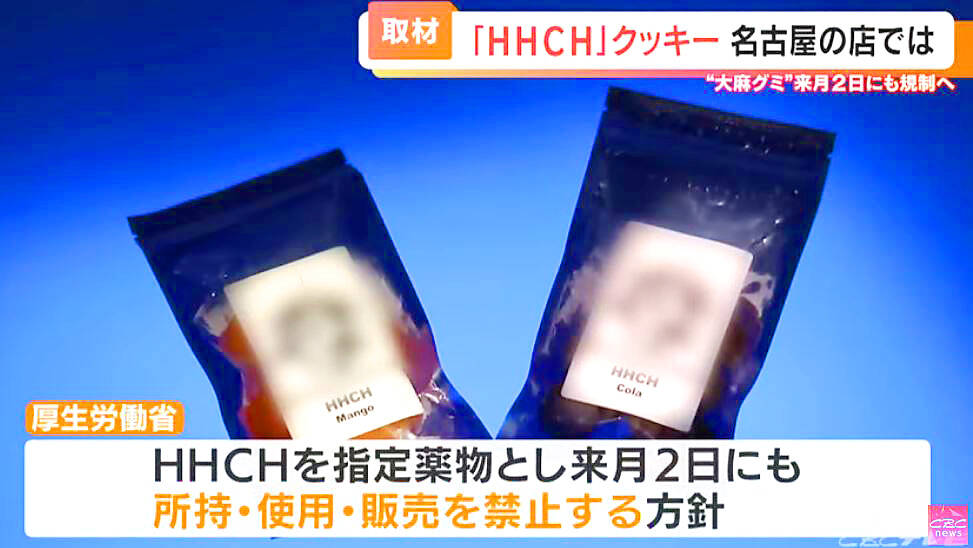Taiwanese visiting Japan should beware of consuming cannabinoid gummies following recent reports of numerous people in Tokyo falling ill after taking them, the Japanese Ministry of Foreign Affairs has warned.
On Nov. 4, five people aged from their teens to their 50s fell ill after taking gummies containing hexahydrocannabihexol (HHCH) — a substance that mimics cannabis — sold to them by a man at a festival in western Tokyo, Japanese media reported.
In the first two weeks of this month, 11 others reported similar symptoms after consuming HHCH gummies at subway stations, parks and apartments, the Tokyo Fire Department said.

Photo: Screengrab from Japan’s CBC News’ YouTube channel
Japanese Minister of Health, Labour and Welfare Keizo Takemi on Monday said his ministry plans to ban HHCH.
It would be designated a psychoactive drug and possessing, using or distributing the substance would soon be illegal, he said.
Fan Chen-kuo (范振國), secretary-general of the Ministry of Foreign Affairs’ Taiwan-Japan Relations Association, said in Taipei yesterday that Taiwan’s representative office in Tokyo had earlier this month received calls for help from Taiwanese living or traveling in Japan.
Family members of one of the individuals contacted the office after they were unable to get in touch with one of their adult children, who was later taken to hospital after consuming gummies, Fan said.
Gummies containing HHCH can easily be found in stores in Tokyo and Osaka, and online, Fan said, calling on people to stop consuming them due to the physical discomfort they can cause.
Fan said that HHCH could be banned in Japan as soon as Saturday next week.
Once it is listed as an illegal drug, Taiwanese caught buying, selling or consuming HHCH gummies would face legal consequences in Japan, he said.
The Japanese Ministry of Health, Labour and Welfare is considering banning all substances with a similar structure to HHCH, which can cause hallucinations and memory impairment, Japanese media have reported.
Tetrahydrocannabinol, the primary psychoactive compound of cannabis is banned in Japan and Taiwan.

An undersea cable to Penghu County has been severed, the Ministry of Digital Affairs said today, with a Chinese-funded ship suspected of being responsible. It comes just a month after a Chinese ship was suspected of severing an undersea cable north of Keelung Harbor. The National Communications and Cyber Security Center received a report at 3:03am today from Chunghwa Telecom that the No. 3 cable from Taiwan to Penghu was severed 14.7km off the coast of Tainan, the Ministry of Digital Affairs said. The Coast Guard Administration (CGA) upon receiving a report from Chunghwa Telecom began to monitor the Togolese-flagged Hong Tai (宏泰)

A cat named Mikan (蜜柑) has brought in revenue of more than NT$10 million (US$305,390) for the Kaohsiung MRT last year. Mikan, born on April 4, 2020, was a stray cat before being adopted by personnel of Kaohsiung MRT’s Ciaotou Sugar Refinery Station. Mikan was named after a Japanese term for mandarin orange due to his color and because he looks like an orange when curled up. He was named “station master” of Ciaotou Sugar Refinery Station in September 2020, and has since become famous. With Kaohsiung MRT’s branding, along with the release of a set of cultural and creative products, station master Mikan

RISING TOURISM: A survey showed that tourist visits increased by 35 percent last year, while newly created attractions contributed almost half of the growth Changhua County’s Lukang Old Street (鹿港老街) and its surrounding historical area clinched first place among Taiwan’s most successful tourist attractions last year, while no location in eastern Taiwan achieved a spot in the top 20 list, the Tourism Administration said. The listing was created by the Tourism Administration’s Forward-looking Tourism Policy Research office. Last year, the Lukang Old Street and its surrounding area had 17.3 million visitors, more than the 16 million visitors for the Wenhua Road Night Market (文化路夜市) in Chiayi City and 14.5 million visitors at Tainan’s Anping (安平) historical area, it said. The Taipei 101 skyscraper and its environs —

Taiwan on Friday said a New Zealand hamburger restaurant has apologized for a racist remark to a Taiwanese customer after reports that it had first apologized to China sparked outrage in Taiwan. An image posted on Threads by a Taiwanese who ate at Fergburger in Queenstown showed that their receipt dated Sunday last week included the words “Ching Chang,” a racial slur. The Chinese Consulate-General in Christchurch in a statement on Thursday said it had received and accepted an apology from the restaurant over the incident. The comment triggered an online furor among Taiwanese who saw it as an insult to the